As pet owners, we always want to ensure that our furry friends are well taken care of, especially when it comes to their diet. If you’re a ferret owner, you may be wondering if it’s safe to share your favorite movie snack, popcorn, with your furry companion. In this article, we will delve into the facts to determine whether ferrets can safely eat popcorn and explore the best diet for these curious and energetic creatures.
Key Takeaways:
- Ferrets can eat plain, unsalted popcorn in small quantities as an occasional treat.
- Popcorn offers minimal nutritional value for ferrets, so it should not replace their main diet.
- Some types of popcorn, such as those with unpopped kernels or salted popcorn, can be harmful to ferrets and should be avoided.
- There are healthier treats and foods that are more suitable for ferrets, such as raw meat, lamb, turkey, cat treats, cooked egg, and chicken baby food.
- It is important to consult with a veterinarian for specific dietary recommendations for your ferret’s optimal health and well-being.
The Importance of a Proper Ferret Diet
Ferrets are unique animals that require a specific diet to thrive and stay healthy. As obligate carnivores, their bodies are designed to primarily digest and absorb nutrients from meat. This means that a high-quality, meat-based diet is essential for their overall well-being.
Feeding your ferret a proper diet is crucial for several reasons. Firstly, their bodies require a high amount of protein and fat to fulfill their nutritional needs. Aim for a diet that provides at least 32% protein and 15-20% fat to support their growth and energy levels.
Raw meat is considered the best option for meeting a ferret’s dietary requirements. It closely replicates their natural diet in the wild and provides the necessary nutrients they need to thrive. However, it’s important to note that ferrets have a short digestive tract and a fast metabolic rate. As a result, they should be fed small, frequent meals to aid in digestion and prevent nutritional imbalances.
The Key Components of a Proper Ferret Diet:
- High-quality, raw meat: This should form the basis of their diet and can include options such as chicken, turkey, or lamb.
- Supplements: Ferrets may require certain supplements to ensure they receive all the necessary vitamins and minerals. Consult with a veterinarian for guidance on which supplements are suitable for your ferret.
- Treats: While treats can be a part of your ferret’s diet, they should only be given in moderation and should not replace the main diet. Opt for healthy treats such as cooked egg, cat treats, or chicken baby food.
- Hydration: Ensure your ferret has access to fresh, clean water at all times to prevent dehydration.
By providing your ferret with a proper diet, you can help prevent health issues and promote their overall well-being. Remember to consult with a veterinarian to develop a specific feeding plan tailored to your ferret’s needs.
Popcorn Dangers for Ferrets
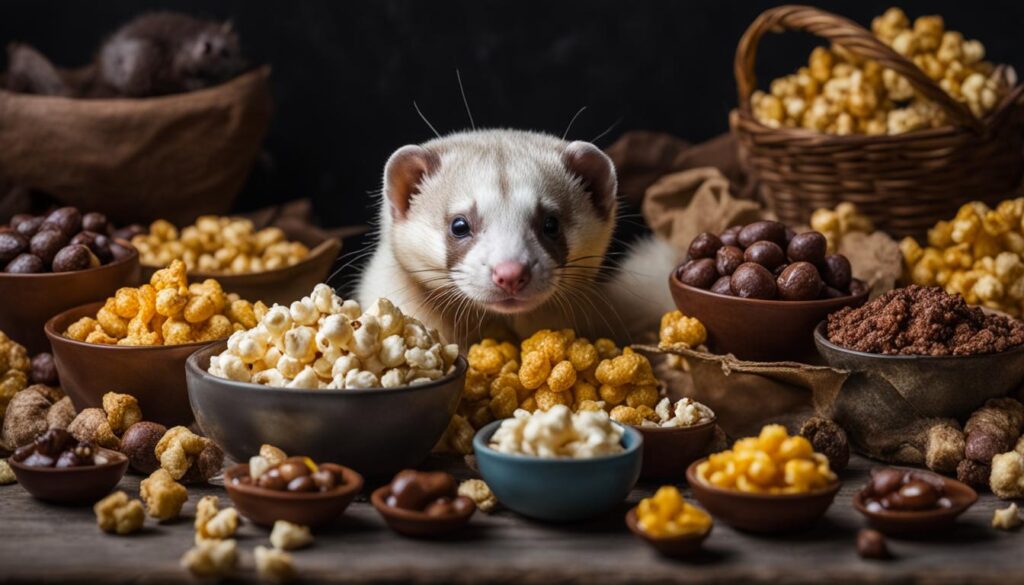
While plain, unsalted popcorn can be safe for ferrets to consume in small quantities, there are certain dangers associated with feeding popcorn to ferrets. It’s important for ferret owners to be aware of these risks to ensure the health and well-being of their furry friends.
Unpopped Kernels and Digestive Issues
One of the main dangers of popcorn for ferrets is the risk of choking and digestive issues caused by unpopped kernels. Ferrets have small digestive systems that may struggle to process and eliminate these hard kernels, leading to blockages or discomfort.
Salt Toxicity
Salted popcorn should be strictly avoided when it comes to feeding ferrets. Salt can be toxic to these small animals, leading to dehydration, electrolyte imbalances, and other serious health issues. It’s important to offer only unsalted popcorn or consider alternative treats for your ferret’s enjoyment.
Sugar Content and Long-Term Health Problems
While popcorn may seem like a harmless treat, the high sugar content in flavored, caramel, or sweetened popcorn can be detrimental to a ferret’s health. Excessive sugar consumption can contribute to long-term health problems such as insulinoma tumors and obesity. It’s best to prioritize healthier treats and snacks that provide the necessary nutrition for your ferret.
It’s important to remember that while ferrets can consume small amounts of popcorn, it should never be a staple in their diet. Prioritizing a proper diet consisting of raw meat and other suitable treats will ensure that your ferret receives the necessary protein and fat for their overall health and well-being.
Safe and Healthy Treats for Ferrets
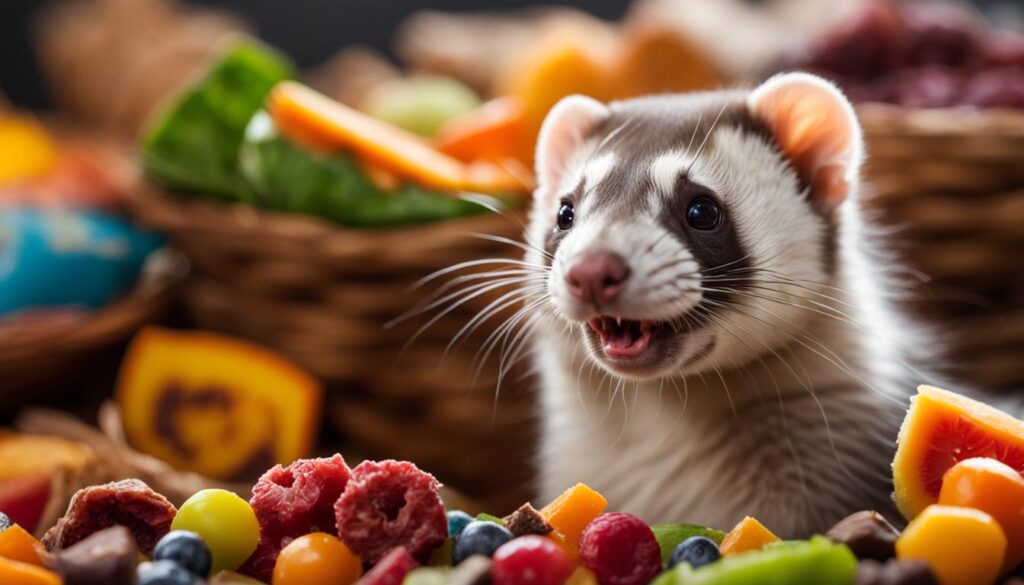
When it comes to treating our furry friends, it’s essential to provide them with safe and healthy options. Ferrets, being obligate carnivores, have specific nutritional needs that should be met to ensure their well-being. While popcorn may not be the best choice for ferrets, there are several other treats that are both safe and nutritious.
Here are some healthy treats that your ferret will love:
- Lamb: Lean cuts of lamb are an excellent source of protein for ferrets. You can offer small pieces of cooked lamb as a special treat.
- Turkey: Cooked turkey meat, without any seasoning or additives, can provide a tasty and protein-rich snack for your ferret.
- Cat treats: Many cat treats are suitable for ferrets as well. Look for high-protein options without any harmful ingredients.
- Cooked egg: Eggs are another great source of protein for ferrets. Make sure the egg is fully cooked and offer small portions occasionally.
- Chicken baby food: Plain chicken baby food can be a convenient and nutritious treat for your ferret. Just make sure it does not contain any added ingredients.
Remember, treats should always be given in moderation and should not replace the main diet of raw meat. Providing a balanced variety of safe and healthy treats can help keep your ferret happy and satisfied while ensuring their nutritional needs are met. If you are unsure about any specific treat or have concerns about your ferret’s diet, consult with a veterinarian for professional advice.
Additional Tips for Ferret Care
In addition to providing safe and nutritious treats, here are some other important aspects of ferret care to keep in mind:
- Provide fresh water at all times to keep your ferret hydrated.
- Ensure your ferret has a clean and comfortable living environment with plenty of space to play and explore.
- Regularly clean your ferret’s litter box to maintain good hygiene.
- Groom your ferret regularly to keep their coat clean and healthy.
- Provide plenty of opportunities for exercise and mental stimulation through toys, playtime, and interaction.
By following these tips and offering safe and healthy treats, you can provide the best care for your beloved ferret and ensure they live a happy and fulfilling life.
Ferret Care: Preventing Ferrets from Eating Popcorn
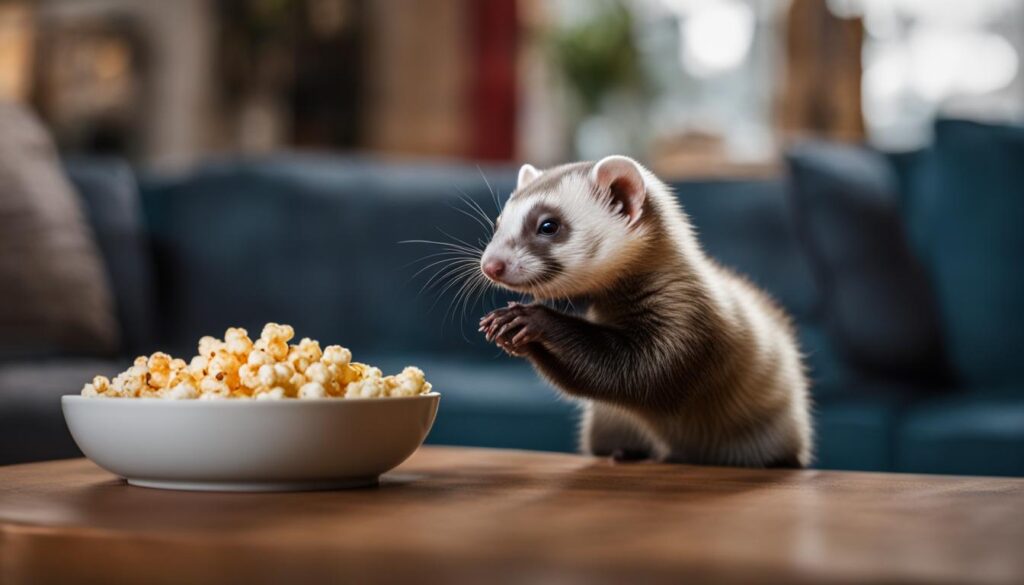
When it comes to ferret care, it’s important to be mindful of their diet and potential food restrictions. While ferrets can eat small quantities of plain, unsalted popcorn as an occasional treat, it’s crucial to take precautions to prevent them from stealing popcorn and encountering potential health hazards.
1. Secure Your Popcorn
Ferrets have a natural hoarding instinct and may try to steal popcorn if they have access to it. To avoid this, keep popcorn and other potentially harmful human foods in locked cabinets or containers. By restricting their access, you can ensure they don’t accidentally consume popcorn or choke on unpopped kernels.
2. Limit Access to Kitchen and Dining Areas
Another way to prevent your ferret from eating popcorn is by limiting their access to the kitchen and dining areas. Close doors and windows to these spaces to create a physical barrier. This will help to prevent them from sneaking in and stealing popcorn when you’re not looking.
3. Provide Ample Distractions
Redirecting your ferret’s attention and providing them with plenty of toys can help prevent them from seeking out popcorn. Engage them in interactive playtime or provide puzzle toys to keep them entertained. This way, they’ll be less inclined to focus on finding popcorn.
By following these preventative measures, you can ensure the safety and well-being of your ferret while maintaining a healthy diet for them. Remember, while popcorn can be enjoyed by humans and some pets, it’s important to prioritize your ferret’s specific dietary needs and offer them safe and suitable treats instead.
Can Ferrets Eat Popcorn? a Guide to Popcorn and Other Pets
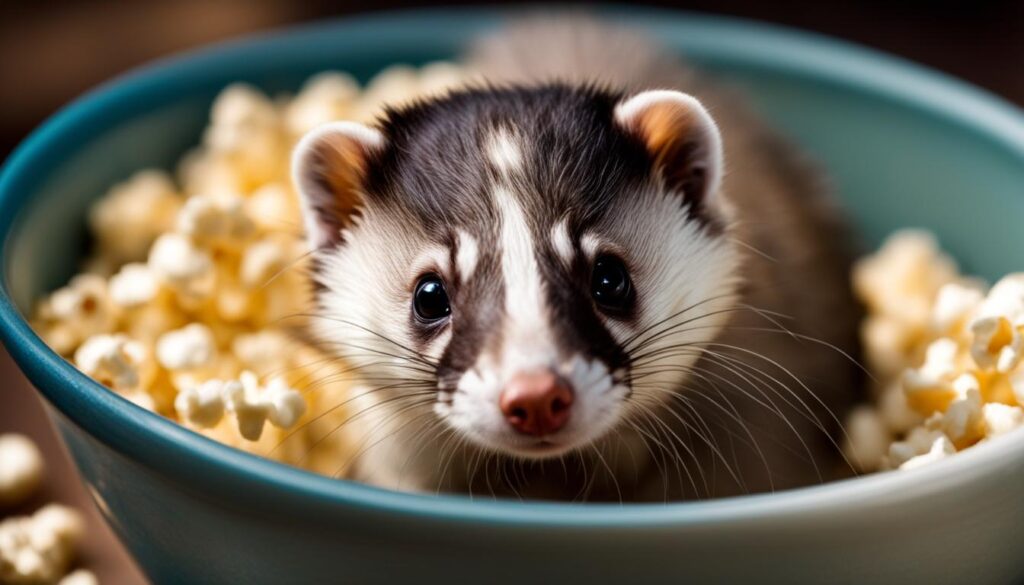
Popcorn is a popular snack enjoyed by many, but can our furry friends partake in this tasty treat? In this section, we will explore whether ferrets, cats, dogs, hamsters, guinea pigs, hedgehogs, and rabbits can eat popcorn. While ferrets can have small quantities of plain, unsalted popcorn, it’s important to consider the specific dietary needs of other pets.
Can Cats Eat Popcorn?
Cats can eat popcorn in moderation, but it’s crucial to ensure that it is free from any harmful additives or seasonings. Plain, air-popped popcorn without salt or butter is the safest option. However, popcorn should not be a significant part of a cat’s diet as they require a balanced diet rich in proteins and fats from a quality cat food.
Can Dogs Eat Popcorn?
Yes, dogs can eat popcorn as long as it is plain and unsalted. Nevertheless, it’s crucial to remember that popcorn should only be given in moderation and should not replace a balanced diet. Additionally, be cautious of choking hazards such as unpopped kernels and never feed dogs flavored or seasoned popcorn, as certain additives can be harmful to their health.
Can Hamsters, Guinea Pigs, Hedgehogs, and Rabbits Eat Popcorn?
Hamsters, guinea pigs, hedgehogs, and rabbits should not be fed popcorn. Their digestive systems are not intended to process corn or other starchy foods like popcorn. These pets have specific dietary needs, and offering them a diet rich in hay, fresh vegetables, fruits, and species-specific pelleted food is crucial for their overall health and well-being.
In conclusion, while ferrets can enjoy plain, unsalted popcorn in moderation, it is essential to consider the dietary needs of other pets. Cats and dogs can also have small quantities of plain popcorn, but it should not replace their regular diet. Hamsters, guinea pigs, hedgehogs, and rabbits, on the other hand, should not be given popcorn at all. As responsible pet owners, it’s crucial to prioritize the health and nutritional needs of our furry friends, ensuring they receive a proper diet that meets their specific requirements.
Exploring Other Pet-Friendly Popcorn Options
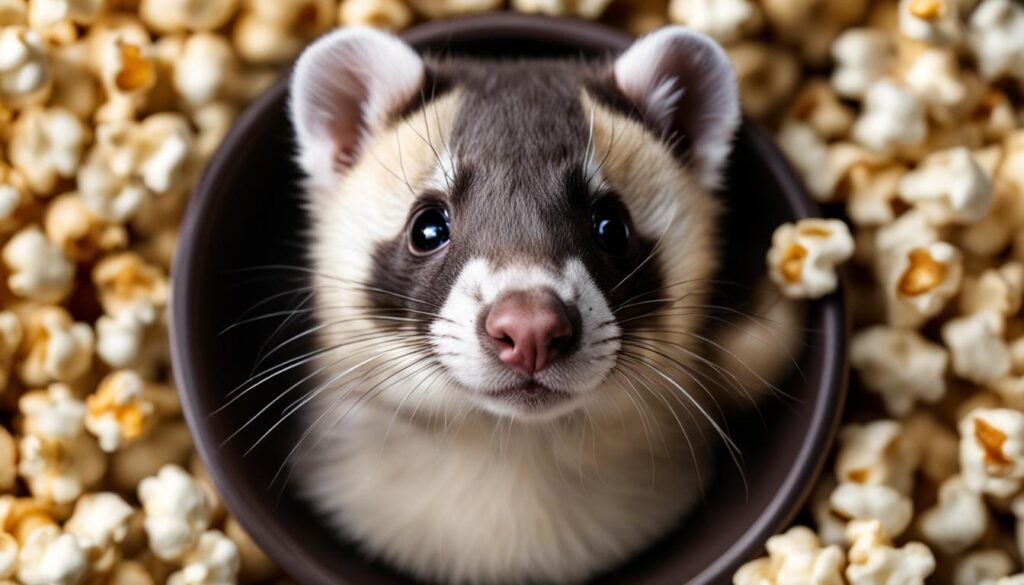
When it comes to enjoying a movie night with our pets, it’s only natural to want to share some popcorn. While not all pets can safely indulge in this snack, there are some furry and feathered friends who can enjoy popcorn in moderation. Let’s explore the pet-friendly popcorn options that are safe for our beloved companions.
If you have a cat, dog, chinchilla, mouse, rat, hamster, fish, hedgehog, or pet bird, you can share some plain air-popped popcorn with them. However, it’s important to remember that moderation is key. Popcorn should never replace the main diet of these pets and should only be given as an occasional treat.
Air-Popped Popcorn: A Safe Choice for Some Pets
- Plain air-popped popcorn is a safe treat option for cats, dogs, chinchillas, mice, rats, hamsters, fish, hedgehogs, and pet birds.
- Make sure the popcorn is free from seasonings, butter, or any additional toppings.
- Always feed popcorn in moderation and alongside a balanced diet that meets your pet’s specific nutritional needs.
Remember, every pet has unique dietary requirements, so it’s essential to consult with a veterinarian before introducing new foods into their diet. Your veterinarian can provide you with the best guidance on which treats are safe and appropriate for your pet.
Exploring Other Snacks and Treats
If you’re looking to provide a well-rounded diet for your pet, there are plenty of other snacks and treats to consider. For example:
- Cats can enjoy cooked fish or small pieces of cooked chicken as a tasty alternative to popcorn.
- Dogs can benefit from crunchy carrots, green beans, or freeze-dried meat treats instead of popcorn.
- Hamsters and mice can munch on small pieces of fresh vegetables or fruits like carrots, apples, or berries.
- Pet birds can enjoy a variety of fruits, vegetables, and seeds as part of their balanced diet.
By offering a diverse range of safe and healthy treats, you can keep your pets happy and satisfied without compromising their overall well-being.
Conclusion
In summary, when it comes to popcorn and ferrets, it’s important to exercise caution. While plain, unsalted popcorn can be given to ferrets as an occasional treat, it should never replace their main diet. Ferrets are obligate carnivores and require a diet high in protein and fat, which is best provided by raw meat. Giving your ferret safe and healthy treats like lamb, turkey, cat treats, cooked egg, and chicken baby food can add variety to their diet.
Remember to avoid popcorn with harmful additives, such as salt, butter, or caramel. These can cause digestive issues, salt toxicity, and long-term health problems. Additionally, be mindful of the risks associated with popcorn, such as choking hazards from unpopped kernels. It’s always a good idea to consult with a veterinarian for specific dietary recommendations for your ferret.
At the end of the day, our goal is to prioritize the well-being of our beloved ferrets. By providing them with a proper diet, safe treats, and a loving environment, we can ensure they live happy and healthy lives. So, while the occasional popcorn treat may be enjoyed by your furry friend, let’s remember to focus on their overall nutrition and care.
FAQ
Can ferrets eat popcorn?
Yes, ferrets can eat plain, unsalted popcorn in small quantities as an occasional treat. However, there are certain dangers associated with feeding popcorn to ferrets, such as unpopped kernels and salt toxicity. It is important to be cautious and prioritize a proper diet for ferrets.
What other foods are suitable for a ferret’s diet?
Ferrets require a diet that is high in protein and fat. Raw meat, such as lamb, turkey, and chicken, is the best option for meeting their nutritional needs. Cat treats, cooked eggs, and chicken baby food can also be given as healthy treats. It is important to establish healthy eating habits early on to prevent the development of unhealthy food preferences.
Why is popcorn dangerous for ferrets?
There are several dangers associated with feeding popcorn to ferrets. Unpopped kernels can be a choking hazard and cause digestive issues. Salted popcorn can lead to salt toxicity, which can be life-threatening for ferrets. Ferrets are also lactose intolerant, so buttered popcorn or any dairy products should be avoided. Caramel popcorn and other sugary snacks can contribute to long-term health problems.
How can I prevent my ferret from stealing popcorn?
To prevent this behavior, it is important to keep popcorn and other potentially harmful human foods in locked cabinets. Limiting your ferret’s access to the kitchen and dining area by closing doors and windows can also help. Providing your ferret with plenty of toys and ensuring they are well-supervised during playtime can redirect their attention and prevent them from seeking out popcorn.
Can other pets eat popcorn?
Cats and dogs can eat popcorn in moderation, as long as it is free from harmful additives or seasonings. However, hamsters, guinea pigs, hedgehogs, and rabbits should not be fed popcorn, as it can be difficult for their digestive systems to process. Each pet has specific dietary requirements, so it is important to consult with a veterinarian before introducing new foods to their diet.
Are there other pet-friendly popcorn options?
Yes, cats, dogs, chinchillas, mice, rats, hamsters, fish, hedgehogs, and pet birds can consume plain air-popped popcorn as long as it is free from seasonings or additional toppings. However, it is important to ensure that popcorn is given in moderation and does not replace the main diet of these pets. Other snacks and treats that are more suitable for specific pets can be explored to provide a well-rounded and balanced diet.
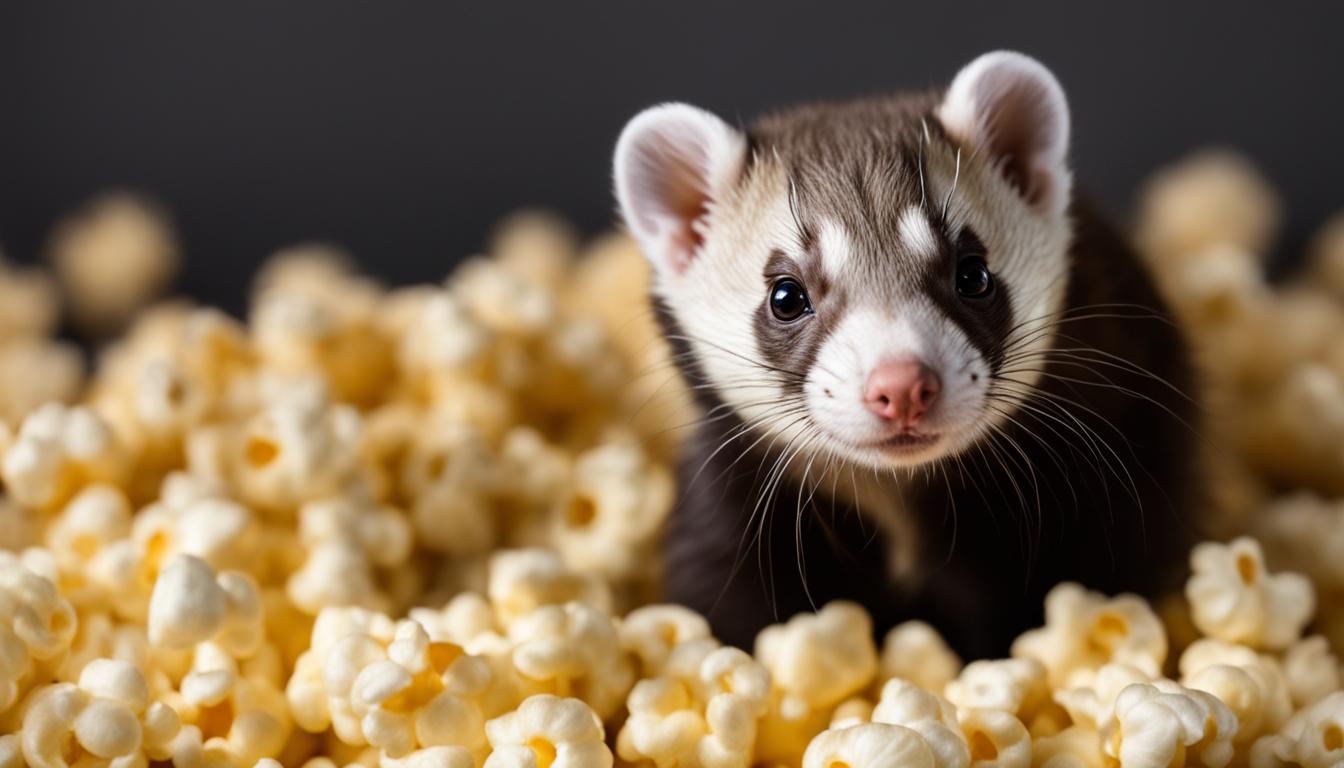
Leave a Reply